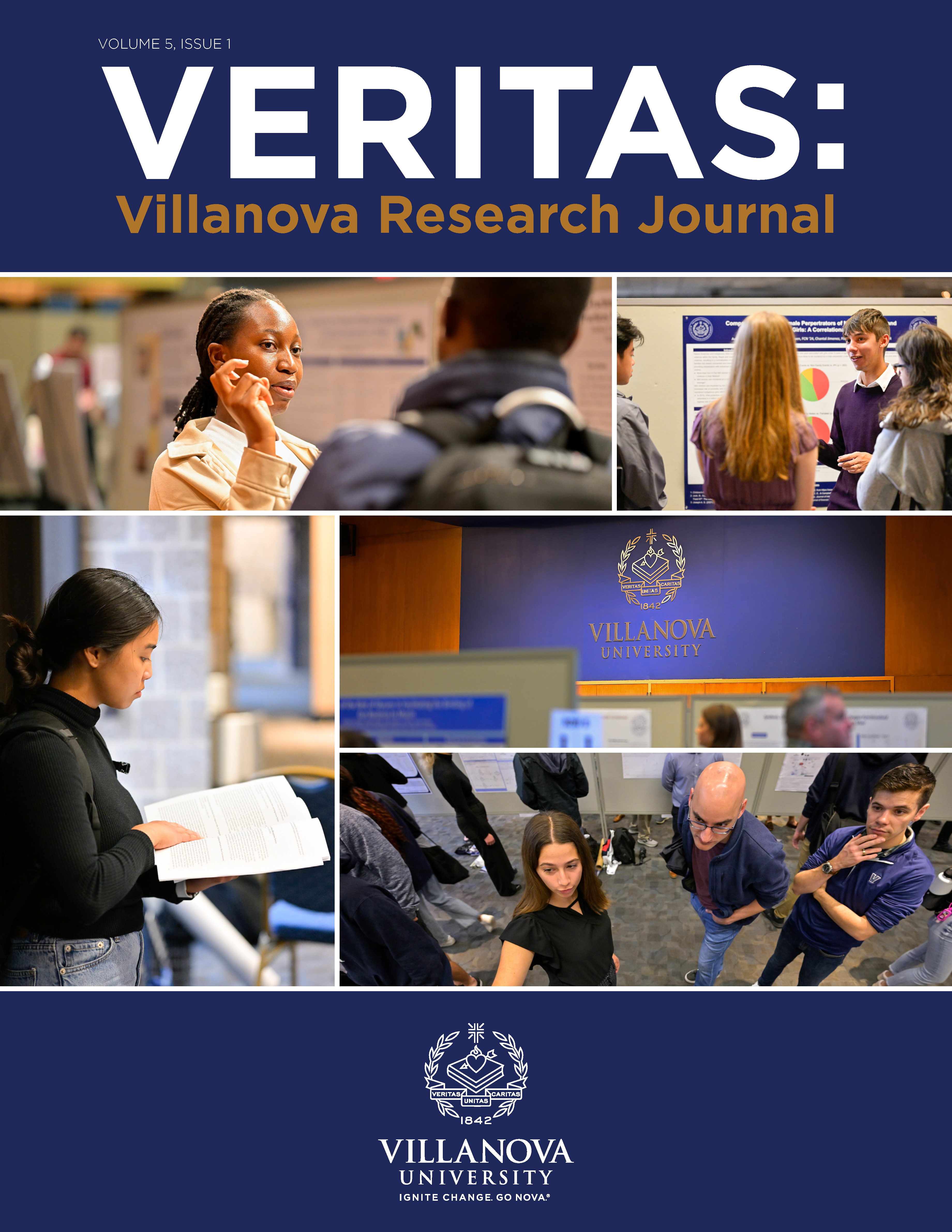Who is on Villanova's Syllabi? An Evaluation of Demographic Disparity in Villanova University's Syllabi
Main Article Content
Abstract
Two questions guided this research: who is on Villanova University's syllabi and why do the resulting demographics of the Villanova syllabi authors fall the way they do? This study aims to look at contemporary issues of representation of minority and female authors in academia through the example of Villanova University's syllabi. It accomplishes this through a two-part examination of the disparity present across the demographics of Villanova University's four undergraduate college's syllabi. Two hypotheses are tested to explain this lack of representation; that this disparity is caused by the biases attributed to the demographics of the professors crafting the syllabi and that the disparity is dependent on the field of academic the syllabi fall within. This study found that there is a demographic disparity present across the four undergraduate colleges at Villanova, with 70% of the data's assigned authors being men and 24% of them women, 90% of those authors working within the Global North, and only 7% were Black scholars. The study also found that there were differences in demographic disparities across varying academic fields. The study aims to bring the lack of representation in academia to the attention of Villanova University.
Article Details
References
Aaron Clauset et al. Systematic inequality and hierarchy
in faculty hiring networks. Sci. Adv. 1, e1400005(2015).
DOI:10.1126/sciadv.1400005
Allen, Beryl M. “Gender, Methodology and the Curriculum
Process.” Teaching History, no. 83 (1996): 14–16. http://www.
jstor.org/stable/43258430.
Bosquet, Clément and Combes, Pierre-Philippe, Do Large
Departments Make Academics More Productive? Agglomeration
and Peer Effects in Research (March 2013). CEPR Discussion
Paper No. DP9401, Available at SSRN: https://ssrn.com/
abstract=2244081
Breuning, Marijke, and Kathryn Sanders. “Gender and Journal
Authorship in Eight Prestigious Political Science Journals.” PS:
Political Science & Politics 40, no. 2 (2007): 347–51. doi:10.1017/
S1049096507070564.
Colgan, Jeff. “Gender Bias in International Relations Graduate
Education? New Evidence from Syllabi.” PS: Political
Science & Politics 50, no. 2 (2017): 456–60. doi:10.1017/
S1049096516002997.
International Conference on Classical Influences King’s College,
Cambridge, England, and R. Bolgar. Classical Influences on
Western Thought A.D. 1650-1870: Proceedings of an International
Conference Held at King’s College, Cambridge, March 1977.
Cambridge; New York: Cambridge University Press, 1979.
Mitchell, Sara McLaughlin, Samantha Lange, and Holly Brus.
“Gendered Citation Patterns in International Relations Journals.”
International Studies Perspectives 14, no. 4 (2013): 485–92.
http://www.jstor.org/stable/44214635.
National Academy of Sciences (US), National Academy of
Engineering (US), and Institute of Medicine (US) Committee on
Maximizing the Potential of Women in Academic Science and
Engineering. Beyond Bias and Barriers: Fulfilling the Potential of
Women in Academic Science and Engineering. Washington (DC):
National Academies Press (US); 2007. Committee on Science,
Engineering, and Public Policy. https://www.ncbi.nlm.nih.gov/
sites/books/NBK9817/
Nzinga, S.M. (2020). Lean Semesters: How Higher Education
Reproduces Inequity. Baltimore: Johns Hopkins University
Press., doi:10.1353/book.77153.
Oprisko, Robert, Honor, Prestige, and the Academy: A Portrait
of Political Science Tenured and Tenure-Track Faculty in Ph.D.-
Granting Institutions (2012-2013) (2013). Political Science and
Politics, published by Cambridge University Press, Forthcoming,
American Political Science Association 2013 Annual Meeting,
APSA 2013 Annual Meeting Paper.
Østby, Gudrun et al. “Gender Gap or Gender Bias in Peace
Research? Publication Patterns and Citation Rates for Journal of
Peace Research, 1983–2008.” International Studies Perspectives,
(2013) 493-506. doi: 10.1111/insp.12025
Subotic, Jelena. “Constructivism as Professional Practice in the
US Academy.” PS: Political Science & Politics 50, no. 1 (2017):
–88. doi:10.1017/S1049096516002201.
Young, Cheryl D. 1995. “An Assessment of Articles Published
by Women in 15 Top Political Science Journals.” PS: Political
Science and Politics 28: 525–33.

